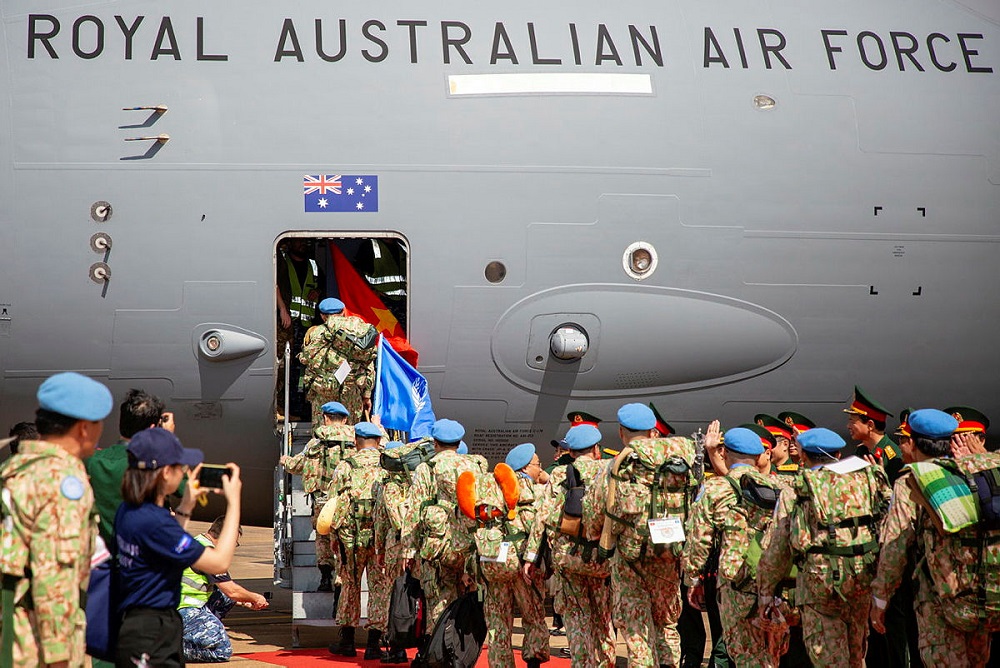
The unclassified version of Australia’s defence strategic review only mentions peacekeeping directly twice. It refers to Australia’s ‘enviable international reputation as a capable country in military, peacekeeping, and humanitarian assistance and disaster relief operations’ and acknowledges that climate-change-driven disasters and mass migration could foster conflict and increase our region’s demand for peacekeeping. It seems to imply that peacekeeping has been and will remain a key activity for the Australian Defence Force, but Australia’s current commitments to peacekeeping are minimal, and the review provides no details on Australian plans to participate in future peace operations.
If Australia wants to meet the review’s recommendations that it meaningfully contribute to the collective security of the Indo-Pacific and to the maintenance of the global rules-based order, then it needs to seriously consider its role in UN peace operations.
Australia has a proud history in peacekeeping. In 1947, Australians were deployed to the Dutch East Indies (now Indonesia) as part of the UN’s first-ever peacekeeping effort and have been engaged in peace operations around the world every year since. The zenith was reached in the late 1990s and early 2000s with Australia leading peacekeeping efforts in Bougainville (1998–2003), East Timor (1999–2000) and Solomon Islands (2003–2016). The experience of these deployments has made the ADF the security provider of choice for many countries in the region.
However, the 11 September 2001 terror attacks in the US and the subsequent wars in Afghanistan and Iraq diverted Australia’s political and military focus. Peacekeeping efforts dropped off and have remained low. At the 2014 UN leaders’ summit on peacekeeping, Australia declined to commit to contributing more peacekeepers, instead offering strategic airlift support to the UN for crisis situations.
Once seen as a regional peacekeeping leader, Australia now lags behind other countries in the Indo-Pacific. At the end of July 2023, only 26 Australians were deployed as UN peacekeepers, mostly in advisory roles. In contrast, on the same date, Indonesia was contributing 2,710 peacekeepers to UN missions, China 2,277, Cambodia 879, Malaysia 866, Sri Lanka 550, South Korea 542, Fiji 332, Thailand 295 and Vietnam 269.
Australia’s lacklustre engagement is regrettable. Peacekeeping could play an important role in protecting the collective security of the Indo-Pacific and in maintaining the global rules-based order. Collective security relies on cooperation and Australia can use peacekeeping to build that, deepening key relationships in the Indo-Pacific in the process. Many of Australia’s key partners in Asia and the Pacific, such as Indonesia, Malaysia, South Korea and Fiji, are heavily involved in peace operations and keen to work with Australia in the field.
As an example, in 2019, Australia attempted to co-deploy with Fijian peacekeepers in the Golan Heights as part of the United Nations Disengagement Observer Force. It also announced its intent to co-deploy with Indonesian peacekeepers for the first time, signalling a ‘new chapter’ in the Australia–Indonesia partnership. While the work with Fiji was blocked by Syria and cooperation with Indonesia was limited to delivering pre-deployment training, these were good steps towards using peacekeeping more actively to build and maintain strong strategic partnerships with Australia’s neighbours. Such initiatives are opportunities to deepen cross-cultural exchange, build meaningful person-to-person relationships among military and security actors, and develop expertise in working with partner countries.
Peacekeeping efforts like these also help decision-makers move beyond an enemy-focused culture and stay focused on their ultimate goal—peace. As one former Australian peacekeeper noted, ‘Peacekeeping requires patience, respect and a strategic perspective that prioritises long-term stability over short-term results.’ Taking this measured approach enhances Australia’s ability to respond to the diverse security challenges it faces.
Engagement in UN peace operations clearly signals Australia’s investment in the global rules-based order and its most vital institutions. When the 2016 defence white paper identified ‘the stability of the rules-based global order’ as essential to Australia’s security and prosperity, it recommended support to UN peace operations as one way for Australia to protect this order. The UN is more important than ever. With gridlock in the Security Council and waning support from former supporters, the UN needs Australia to better contribute to peace operations to show support for the UN itself. Increased engagement in the UN’s flagship activity is vital to strengthening the organisation, and ultimately the international norms and values that it aims to protect.

